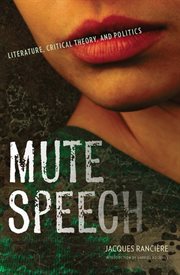Nonfiction
eBook
Details
PUBLISHED
DESCRIPTION
1 online resource
ISBN/ISSN
LANGUAGE
NOTES
Throughout his career, shaped by a notable collaboration with Louis Althusser, Jacques Rancière has continually unsettled political discourse, particularly by examining its relationship to aesthetics. Like Michel Foucault, he broke with his many of his predecessors to upend dominant twentieth-century historical narratives and critical theories. Often overlooked in the canon of his works, Mute Speech contains the critical seeds of Rancière's most provocative assertions, challenging the intellectual orthodoxy that had come to define the nature of art and representation. Arguing that art is neither inherently political nor colonized by politics, Rancière casts art and politics as "distributions of the sensible," or configurations of what are visible and invisible in experience. Through an original reinterpretation of German Romanticism and phenomenology, especially the work of its most prominent figures Kant and Hegel, and engaging with the thought of Germaine de Staël, Jean-Paul Sartre, and Maurice Blanchot, among others, Rancière reevaluates conceptions of art in various decades, from the classical age of representation to the modern, anti-representational turn and its promise of political transformation. Rather than dwell on modernity's "crisis of representation," he celebrates the triumph of realism in modern aesthetics, which for him is the true representative art. Opening radical new vistas onto the history of art and philosophy, Rancière pioneers a theory of aesthetics in which democratic politics constitute the essence of art
Mode of access: World Wide Web







